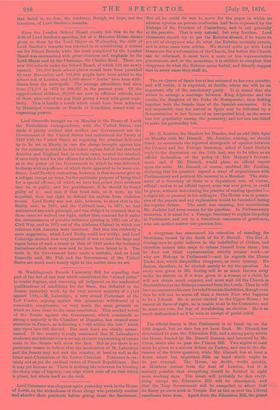Lord Granville brought on on Monday in the House of
Lords the Extradition correspondence with the United States, and made it pretty evident that neither our Government nor the Government of the United States had understood the Treaty of 1842 with the United States as requiring the criminal delivered up to be set at liberty, in case the charge brought against him in the country in which he had taken asylum failed, but that both America and England had, in certain cases, treated the criminal, if once fairly tried for the offence for which he had been extradited, as in the power of the Government to which he was delivered, to charge with any offence of which there appeared to be more evi- dence. Lord Derby's contention, however, is that we never give up a refugee except on trust, for the particular purpose of being tried for a special offence, of which we have had primd fade evidence that he is guilty, and for punishment, if he should be found guilty of it ; and that if that trust fails, as it were, by his acquittal, then our right to defend his asylum from violation recurs. Lord Derby was not able, however, to show that in the Burley case, in 1865, and the Caldwell case, in 1871, we had maintained any such principle, and was obliged to contend that in these cases we waived our right, rather than contend for it under the circumstances of peculiar irritation (arising in 1865 out of the Civil War, and in 1871 out of the Alabama Claims) in which our relations with America were involved. But this was evidently a mere suggestion, which Lord Derby could not verify; and Lord Coleridge showed bow very strained it was to read the large and vague terms of such a treaty as that of 1842 under the technical limitations which were now said to have been latent in it. The truth is, the Government have made a mistake, and as Lord Granville said, Mr. Fish and the Government of the United States are much more nearly right in -the matter than we are.


































 Previous page
Previous page